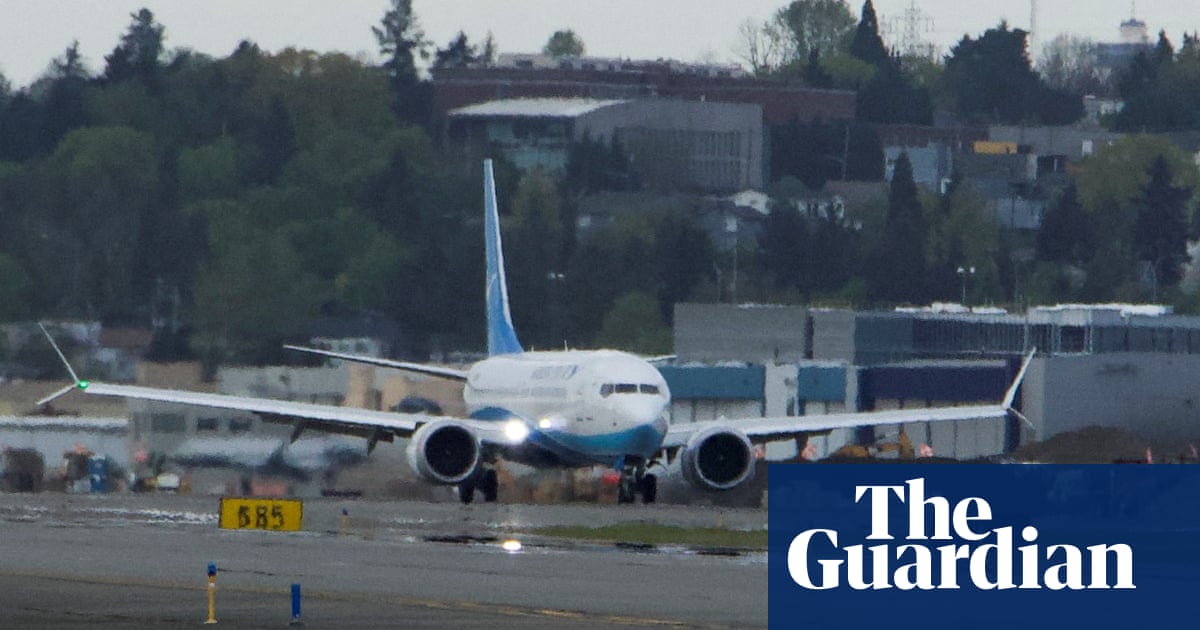Investors in Boeing are braced to learn the full impact of Donald Trump’s trade war, amid fears the US planemaker could be hit harder than first expected after jets intended for a Chinese airline returned to the US.
A Boeing 737 Max 8 plane intended for use by a Chinese airline returned to the US on Monday from Boeing’s China finishing centre, according to flight data cited by Reuters. It followed the arrival in the US on Sunday of another 737 Maxpainted in the livery of China’s Xiamen Airlinesat the planemaker’s US production hub in Seattle.
Boeing’s share price fell by nearly 3% on Monday, in line with a sell-off across Wall Street. US stock markets have been hit with much higher volatility this month as investors have tried to work out the effects of Trump’s tariffs.
The aviation industry has been caught up in the trade war. Trump’s tariffs on goods from almost all countries have caused disruption across the world, with US-China goods trade most affected, with levies of 145% on US imports and125% on goods going the other way.
A new 737 Max has a market value of about $55m (£41.4m), according to IBA, an aviation consultancy. That makes a 125% tariff prohibitive without significantly changing the business model of the airline business.
The return of the Boeing jets underlines the vulnerability to tariffs of the US’s biggest manufacturing exporter. It adds to Boeing’s problems just as it was trying to recover from a mid-air door panel blowout in January 2024 that prompted the company to replace its chief executive.
Kelly Ortberg, whotook over Boeing after the safety crisis, will reveal the company’s first-quarter financial results on Wednesday. Analysts expect a significant improvement in sales compared with a year earlier, with revenues forecast to have risen 20% to $19.8bn, although they still expect losses of $466m for the quarter.
However, the results are likely to be overshadowed by questions over the effect of tariffs on the business.
Douglas Harned, an analyst at Bernstein, a research company, said he did not expect “definitive answers” on the tariff hit but was “concerned that risks are larger than expected” given airlines’ discomfort with paying tariffs, and possible delays to production to try to avoid levies.
Harned said the pause on Chinese deliveries could hit cash generation in 2025, although he added that he expected the planes to be delivered eventually.
Yet investors are having to contend with huge uncertainty over the White House’s intentions. Trump’s current policy is to raise tariffs on many countries after the end of a90-day “pause” on higher rates, excluding Chinaafter market turmoil spread to the bond market.
Richard Aboulafia, the managing director of AeroDynamic Advisory, a consultancy, said theTrump administrationhad showed a “profound and hard-earned level of ignorance” of how the aerospace industry works, and that long-term tariffs would be damaging for Boeing.
Aboulafia said that the short-term hit to Boeing’s cash should be relatively limited but added that the company should push back hard against Trump’s tariffs, particularly to avoid a “catastrophic trade war with the rest of the world”.
Sign up toBusiness Today
Get set for the working day – we'll point you to all the business news and analysis you need every morning
after newsletter promotion
For the Chinese market, “in the long term it starts to matter”, Aboulafia said. Chinese airlines are expected to account for as much as a fifth of new aircraft sales, in one of the key markets for Boeing and its European rival Airbus. “You can’t just leave that to Airbus,” Aboulafia said.
In a sign that the trade war could intensify beyond the US-China relationship, Beijing on Monday warned it wouldtake “resolute and reciprocal” countermeasuresagainst other countries negotiating with the US if they made a deal at China’s expense.
However, the rest of the world’s aviation industry may be less likely to be affected by countermeasures, given China’s reliance on US and European planes.
Reuters reported that the 737 Max 8 landed in the US territory of Guam on Monday, after leaving Boeing’s Zhoushan completion centre near Shanghai, data from the flight-tracking website AirNav Radar showed.
A spokesperson for Xiamen Airlines on Monday confirmed to Reuters that two planes marked for the carrier had gone to the US but declined to provide a reason.
Boeing was approached for comment.
